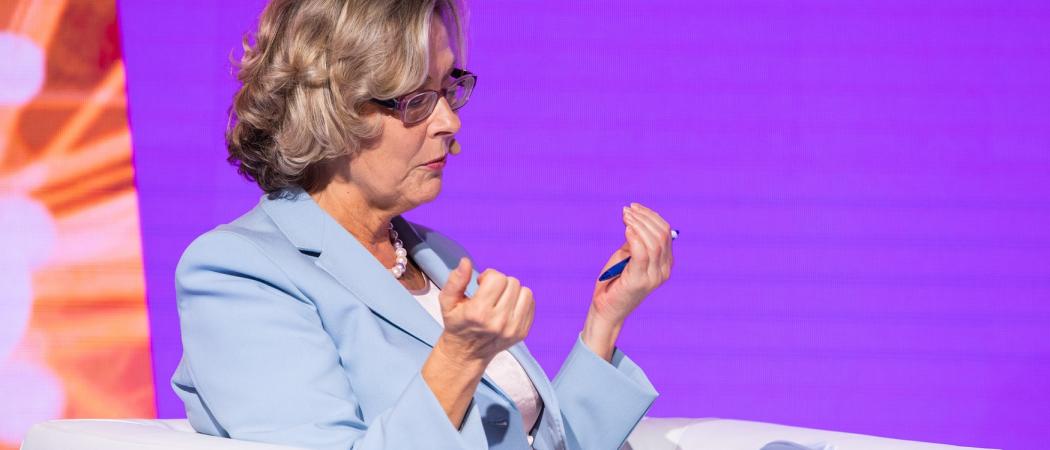Negotiations for 24-plus countries have to wait until EU leaders agree among themselves on Horizon legislation – which won’t be until next year

Signe Ratso, deputy director general for research and innovation, speaking at the R&I days in Brussels. Photo: European Commission
Negotiations to open up the EU’s big R&D programme to other countries in the world are now unlikely to get off the ground until sometime next year, a senior European Commission official has indicated.
Speaking at the commission’s R&I Days conference in Brussels on Wednesday, Signe Ratso, deputy director general for research and innovation, said talks with non-EU countries can only start “when we have the regulation agreed” – a reference to the final EU law authorising the proposed €94.1 billion Horizon Europe programme. Analysts suggest the earliest the law can be signed off is in the first half of 2020 – and it could easily slip to the end of the year if EU leaders can’t agree among themselves.
“We can only start [negotiating] when we have the stable basis of the regulation. The article related to association has not been agreed. Once we have that position, we can start that,” Ratso said, inviting the audience to interpret that as they wish. Her statement appeared to have been prepared in advance.
At present, at least 24 countries – from Switzerland to Canada – are considering joining Horizon Europe, but first want to see the membership terms that the law would spell out. Their embassies in Brussels have been asking the commission for months for more information – but to little avail. They fret that, if membership negotiations don’t get going soon, their researchers won’t be ready to participate in the programme when it starts in January 2021.
The ultimate cause of the delay is Brexit. When (or if) it leaves the EU, the UK is expected to join the queue of non-EU countries seeking Horizon membership. The commission has not wanted to show its negotiating hand to any other country, lest that prejudice the difficult negotiations with the UK. But at the same time, EU leaders can’t finalise the Horizon legislation until they know the size of the budget, and again, that depends on whether the UK is in or out of the EU.
Finnish officials, who currently hold the rotating chair of EU Council, are nevertheless trying to inch the dossier forward and may succeed later this year in getting EU leaders to start discussing Horizon Europe membership terms among themselves. That would at least make sure the EU’s internal position on non-EU countries joining the programme is ready for when the association talks finally begin.
Associated countries
Currently, 16 countries in the European area – from Iceland to Tunisia – are associated to the existing R&D programme, Horizon 2020. That allows their researchers to compete for EU funding on the same footing as EU researchers, on condition that their governments make a payment, based partly on the size of their gross domestic product, into a central EU money pot to help pay for the programme. But for Horizon Europe, the commission has said it wants to change the formula so a country’s membership fee is equivalent to the money its researchers take out of the programme. And some EU politicians also want countries to pay a supplement covering the extra administrative costs the commission may incur in dealing with their researchers.
In the absence of more detailed terms, however, non-EU countries have been unable to do their own budget planning. The Canadian government, for instance, has earmarked about C$25 million (€17.3 million) in a special fund for international R&D collaboration, but doesn’t know yet how much of that should be set aside for EU collaboration and how much for work with other parts of the world.
And the situation for Switzerland is more urgent. Its researchers have been collaborating in EU R&D programmes for decades, and its research infrastructure has evolved to support that. If it ends up in 2021 with no deal with Brussels, Swiss officials say, the effect would be dire.
In the same conference panel with Ratso, Matthias Egger, president of the research council of the Swiss National Science Foundation, said that “EU programmes are incredibly important for Switzerland. They basically foster excellence.” When Switzerland was temporarily excluded from parts of Horizon in 2014 over an immigration dispute with Brussels, the number of research projects its scientists participated in “dropped from 4,300 to 300,” Egger said. “And we’re still catching up and suffering. We’re very keen to avoid this exclusion in the future.”
Association is also important to the EU’s poorer neighbours. Sanja Damjanovic, a physicist and science minister of Montenegro, said her region’s R&D performance is hurt by “brain drain” to the richer EU. “For the six western Balkan countries, [the] gap will get larger if we are not associated” to Horizon Europe, she said.





 A unique international forum for public research organisations and companies to connect their external engagement with strategic interests around their R&D system.
A unique international forum for public research organisations and companies to connect their external engagement with strategic interests around their R&D system.